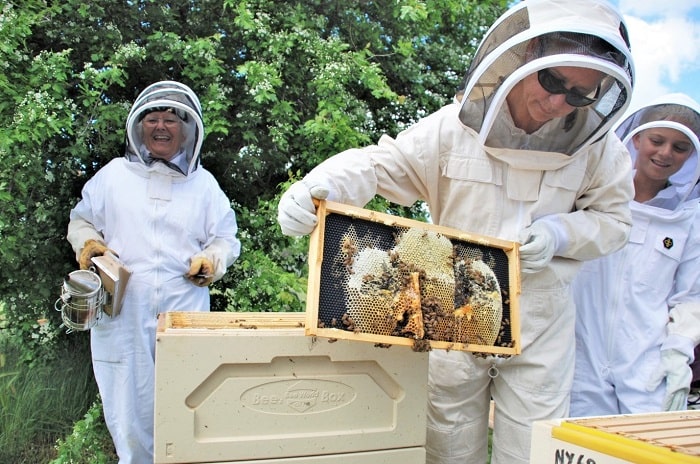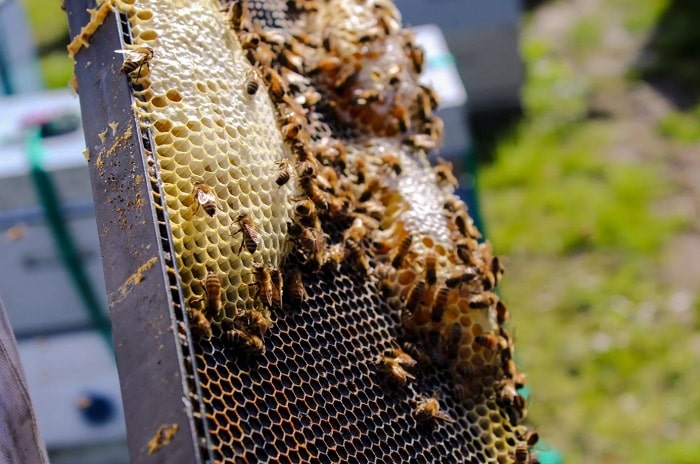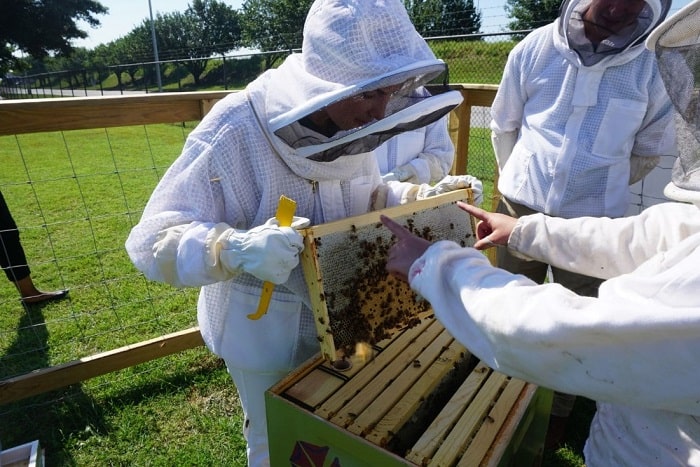As you may have suspected, beekeeping is not a problem-free activity. To be honest, we have discovered quite a number more as we have gained experience. We polled our other beekeepers, and it appears that every novice beekeeper confronts a few common problems with beekeeping or challenges with beekeeping. In this essay, we will discuss these issues and offer some solutions.
Uncertainty about where to obtain information
Beekeeping, like any other activity, has a learning curve. However, as we learned from our experience, it is critical to have a particular level of expertise before getting started. Initial understanding saves you time and money while also assisting your bees to grow stronger.
Beekeeping is an activity that requires an ongoing education. And the reason for this is that no matter how much experience you have, beekeeping will always provide obstacles. There is always something to keep us modest, such as a disease, a nectar shortage, bad weather, market obstacles.
We have a few suggestions for you if you are just starting out. First, purchase a beekeeping book, then take an online or live course and join your local beekeepers association. Then you will just have to figure it out as you go. Continue to learn about bees by reading about them, observing them, and keep learning.

>>> Read more: Top 5 Best Beekeeping Books For Beginners
Getting your first bee colony
Obtaining bees is another area where novice or aspiring beekeepers struggle. Where and how should it be done? There are several methods for obtaining bees:
- Trapping wild swarms
- Buying nucs locally
- Buying packaged & shipped bees
We would advise avoiding trapping the swarm on your own if you are just starting out. Unless you have a more experienced beekeeper to assist you or you are quite confident with bees, go for it. However, doing it all by yourself may be a daunting experience for a rookie beekeeper.
Buying a nuc from fellow beekeepers is, in our opinion, the greatest way for a beginner beekeeper to receive bees. And you will also meet a fellow beekeeper who may be able to assist you in times of need.
Confusion regarding beehive positioning
One of the most typical problems faced by beekeeper is deciding where to install their hive. New beekeepers typically begin in their own backyard. This is a simple approach to get started if you live outside the city, but it has drawbacks if you live among neighbors or near a road. Some publications and websites claim that you can put your beehive nearly anywhere since bees go a long distance to collect nectar.
You will need to choose a location with a good floral supply. It should also keep your bees safe from predators and vandals, have a nearby water source with drainage, and get plenty of sunlight.
Bees require a floral supply
You would assume that if a field is full of flowers, our bees will enjoy it. But let me ask you a question: do you enjoy all the food offered in the supermarket? We are guessing no. Bees are the same; they do not collect nectar from every bloom in your yard. Knowing about the plant species and native variations in your area will aid you on your beekeeping adventure.

Handling queen bees
A hive cannot exist without its Queen. When a beehive is queenless, you will not immediately detect a change in colony behavior. There will be a lot of honey, and traffic at the entrance to the beehive will be typical, because the workers, without larvae to care for, will devote all of their time to foraging. When the beekeeper sees a decline in population, and if the colony has been without a queen for an extended period of time, it is too late and the colony will die.
A queen lays almost 2000 eggs every day. When there is no brood during the warm season, this indicates that your beehive may be queenless.
Another possibility is that you realize that the queen has to be replaced. The aging queen is no longer able to lay as many eggs as she formerly did. The colony’s conduct is not what it should be. Alternatively, the colony is not productive. All of these indicators point to the need to replace your queen.
The good news is that there are numerous ways to replace a queen. Also, bees do a lot of work for you and decide when a new queen is required. If you’re going to announce the new queen, make sure the old queen is dead or gone the day before you do.
Your bee colony’s health
Beekeeping can be difficult at times, and as we previously stated, there is a learning curve. Some amounts of colony loss cannot be prevented on a regular basis. However, keeping beehives healthy is a crucial part of beekeeping.
The Varroa Mite is the world’s number one enemy to beekeepers and bees. This parasite becomes entrapped in your bees, sucking their blood and weakening them till the bees die. They spread quickly across the colonies and apiaries. Because of their great reproductive potential, they provide a genuine menace and a problem for beekeepers.
Small hive beetles, wax moths, foulbrood, nosema, chalkbrood, the sacbrood virus, and other diseases such as the malformed wing virus are other hazards to bees. All of these parasites and diseases are a constant problem for beekeepers, and it is critical to learn how to maintain your apiary’s health because its well-being is dependent on it.
Some of bee problems solutions that we have found and may share with you are as follows:
- Never mix a collapsing colony with a healthy one.
- Never reuse equipment from a collapsing or ill colony in another colony without first sterilizing it.
- Reduce the level of pesticide exposure that your colonies have
- Research, research, and more research into the best management strategies used by other beekeepers.

Market demand and honey prices
Beekeeping nowadays has several obstacles, as we have already discussed, but the major reason a beekeeper quits is that the market drives them out. For example, in Uruguay, one of the world’s most traditional honey exporters, 30 percent of beekeepers abandoned the activity last year.
This is not a problem if you are interested in beekeeping as a hobby. However, you will eventually generate more honey than you can consume, and you may wish to sell some of it. In reality, many governments throughout the world advocate beekeeping as a very sustainable way of lifting people out of poverty.
The cost of honey varies greatly. Like any other activity, it is dependent on supply and demand. And if you live in a large honey consumer market, you may benefit from or be affected by a drought or flood on the other side of the world.
A scarcity of nectar
A nectar dearth is characterized by a scarcity of nectar-producing flowers. And that usually happens in the winter. Recognizing and managing a nectar shortage can be difficult for a beginning beekeeper. If you notice a nectar shortage, you can take the following precautions to protect your bees:
- Give them syrup. To avoid attracting other colonies, do not place a feeder in the hive’s door. To maintain the food inside the beehive, use an internal feeder.
- If you are going to feed them, stay away from essential oils and other things made specifically for nectar deficiency. They will attract bees from a long distance away. Put the nectar inside and do not worry, the bees will find it.
- Keep communal feeders and wet frames away from your apiary. It is an invitation to stronger colonies located near your weaker colony.
- Reduce the number of people who can enter the colony. Upper openings should be kept closed. Whether or whether you intend to feed them, this should be one of the first things you do to protect the colony from other predators.
Conclusion
We understand that beekeeping can appear to be difficult, especially for beginner beekeepers. But the truth is that once you begin reading, learning, and gaining hands-on experience in beekeeping, all of these issues and concerns will appear insignificant. One of the reasons beekeeping is a terrific activity is that it is so diversified and you are constantly learning new things.
Related Posts:
